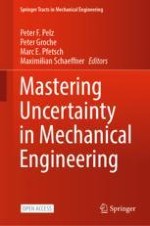This open access book reports on innovative methods, technologies and strategies for mastering uncertainty in technical systems. Despite the fact that current research on uncertainty is mainly focusing on uncertainty quantification and analysis, this book gives emphasis to innovative ways to master uncertainty in engineering design, production and product usage alike. It gathers authoritative contributions by more than 30 scientists reporting on years of research in the areas of engineering, applied mathematics and law, thus offering a timely, comprehensive and multidisciplinary account of theories and methods for quantifying data, model and structural uncertainty, and of fundamental strategies for mastering uncertainty. It covers key concepts such as robustness, flexibility and resilience in detail. All the described methods, technologies and strategies have been validated with the help of three technical systems, i.e. the Modular Active Spring-Damper System, the Active Air Spring and the 3D Servo Press, which have been in turn developed and tested during more than ten years of cooperative research. Overall, this book offers a timely, practice-oriented reference guide to graduate students, researchers and professionals dealing with uncertainty in the broad field of mechanical engineering.
